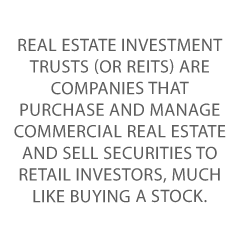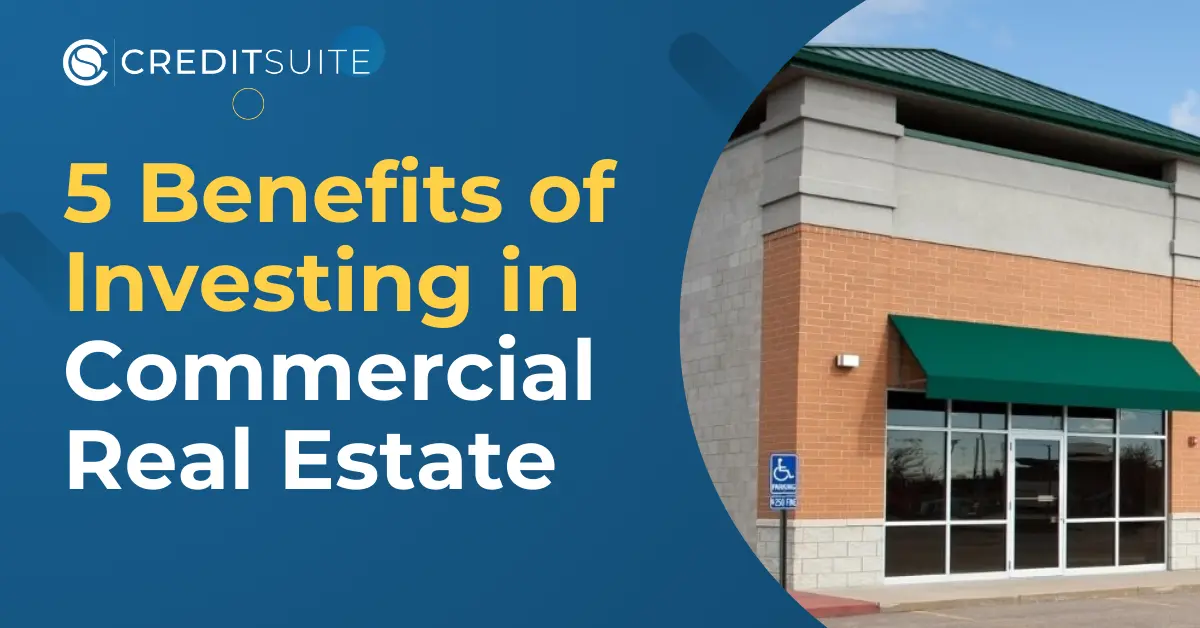Commercial real estate is a lucrative yet misunderstood asset class offering ample opportunity for savvy investors. While most investors start in residential real estate, you should consider adding commercial properties to your portfolio if you want to increase your earning potential.
Commercial real estate investing offers many of the same advantages of residential investing with more favorable conditions, such as more predictable cash flow, consistent appreciation, and high earning potential.
But it can be a complex business and requires serious research and due diligence before you invest. So to help you better understand this profitable technique, here’s a look at the benefits of investing in commercial real estate.
This page contains affiliate links to products. We may receive a commission for purchases made through these links.
What Is Commercial Real Estate Investing?
Commercial real estate investing involves renting to clients engaging in business activities or buying large residential buildings. But, there are several different categories of commercial properties that each offer unique benefits.
Commercial real estate investing is usually more capital-intensive than residential and can often be more complex. But it provides a variety of advantages that benefit investors.
Buying commercial properties also tends to be a bit more exclusive, and you may need experience and connections in the industry to invest directly in a commercial project.
However, REITs and crowdfunding sites also allow investors to get involved in the commercial real estate sector without advanced credentials or qualifications.
You may not want to start with commercial investing if you’re entirely new to real estate. There are often more variables you must consider and risks you must assess if you want to turn a profit. But for those with experience, it makes a great addition to your portfolio.
Commercial real estate investing is also better for those willing to be patient and invest in the long term because it can often take several years for a project to turn a profit. But the substantial returns you can earn are well worth the wait for those willing to wait.
Commercial Real Estate Definition And Types
Commercial real estate is an asset purchased to generate a return through either appreciation, rental income, or both. Except in the case of a multifamily property, the tenants will exclusively be businesses, not individuals.
A multifamily property is a residential building with more than five units; anything less than that is considered residential. There are four main commercial real estate property categories, with several different types of buildings under those categories.
Multifamily
Due to the relative complexity and earning potential of multifamily apartment buildings, they are classified as commercial properties, even though the tenants are not businesses. But their size offers more stability and earning potential than smaller residential properties.
Office Buildings
Office buildings are a common type of commercial property. Businesses need somewhere their workers can congregate and collaborate, which means someone needs to own and manage the spaces where they can do so, offering opportunities to investors.
Industrial
Industrial buildings are properties where products are stored, processed, or manufactured. That includes warehouses, assembly plants, logistics facilities, data centers, research and development facilities, and more.
Retail
Retail properties are where goods and services are directly transacted with customers. That includes shopping centers, warehouse distribution buildings, factory outlets, supermarkets, and mixed-use facilities.
The Basics Of Commercial Real Estate
Commercial real estate is classified based on its function and can be further broken down into subtypes. For instance, retail buildings can include hotels and resorts, bars and restaurants, healthcare facilities, strip malls, etc.
Some commercial properties, such as office buildings and retail, are classified as A, B, or C. This classification gives investors a rough idea of the earning potential of a building, as well as its age, location, features, and amenities.
Class A Buildings
Class A Buildings are the newest and most desirable. They’re typically less than ten years old and found in high-traffic areas with prime real estate. They usually have modern finishes and amenities, including cutting-edge technology and management systems.
Class B Buildings
Class B Buildings tend to be a bit older but still in good condition. They’re usually between 10-20 years old and located in a solid market, but not necessarily the best.
Class B buildings tend to be in good condition but may not have all the modern bells and whistles of a class A building, such as high-speed internet, outdoor terraces, and picturesque views.
Class C Buildings
Class C buildings are the oldest and need the most work. They will likely be more than 20 years old and found in more remote locations. They are unlikely to have any modern amenities and may or may not have a working HVAC or mechanical system.
Class C buildings may require additional construction to become profitable but can be purchased at a greater discount.
This page contains affiliate links to products. We may receive a commission for purchases made through these links.
Why Invest In Commercial Real Estate?
Benefit #1: Predictable Cash Flow
Cash flow is one of the top benefits of investing in commercial real estate. As long as you thoroughly vet your tenants and ensure they have a strong and stable business, you can expect regular monthly payments with a lower risk of default than in residential real estate.
A business has a lot to lose if they fail to pay rent on time; it may lose customers or be forced to halt production if it faces an eviction, resulting in a significant loss of revenue.
Lawsuits and other legal consequences can also threaten the business they’ve worked hard to build, which most entrepreneurs will go to great lengths to avoid.
Plus, depending on the property’s location, you may be able to rent to large corporate clients with stockpiles of cash and assets to prevent default.
Even multifamily properties offer more predictable income than traditional residential buildings because individual vacancies won’t have as much impact on the total cash flow.
Benefit #2: High Earning Potential
Another considerable benefit of investing in commercial properties is earning potential. While commercial real estate investing can be complex and capital-intensive, the potential for greater returns is the upside.
Compared to residential properties, commercial real estate offers higher earning potential than residential properties compared to its value.
This is because prime commercial real estate can generate more revenue for the businesses who rent it, so they are often willing to pay higher rents than individuals.
Commercial real estate can be valued in the millions or even billions of dollars, which offers lucrative opportunities for savvy investors.
Benefit #3: Hedge Against Inflation
Commercial real estate is often used as a hedge against inflation. Due to the stable nature of the asset class, commercial real estate offers consistent appreciation, regardless of what is happening in the economy.
So, historically, that appreciation tends to outpace inflation, making it a wise investment for investors looking to park their spare cash.
Commercial lease agreements tend to be much longer than residential leases and include built-in rent increases that offer a predictable way to generate higher cash flow.
So, even if the dollar’s purchasing power increases, your investment’s value continues increasing, allowing you to protect your wealth against these changes in the market.
Benefit #4: Less Competition
The pool of investors with the knowledge and experience to get into commercial real estate investing tends to be considerably smaller than residential. That offers more opportunity and bargaining power for those who understand the business.
 If you’ve ever bought a home in a hot market or tried to snag a great deal at a real estate auction, you know how quickly good investments get snatched up.
If you’ve ever bought a home in a hot market or tried to snag a great deal at a real estate auction, you know how quickly good investments get snatched up.
That’s because residential real estate investing is common for many Americans, whereas commercial real estate is a bit more niche.
Depending on the market, there may only be a handful of investors in the area with the capital and skills needed to handle the investment, which offers more leverage for those who have the requisite experience.
Benefit #5: Tax Advantages
Commercial real estate also offers a variety of tax advantages that investors should consider. You can deduct depreciation and interest as expenses from your gross profit, which can often result in considerable savings.
Commercial properties often require ongoing maintenance, improvements, and upgrades that can be deducted from your earnings. Then, when you sell commercial property, it’s also subject to a capital gains tax, which is often lower than other income if you’re a high earner.
What Type of Commercial Real Estate Is Most Profitable?
The earning potential of a commercial property depends on many factors, including size, location, and condition.
But, in general, properties offering the highest return on investment usually have the highest number of tenants, such as multifamily buildings and large shopping centers.
If you want to maximize your returns, you’ll want to fit as many tenants as possible into the least amount of square footage.
The more tenants you have, the more rent you can charge, but the larger the building, the more upkeep and maintenance it will require.
So, an apartment building or shopping mall with 100 tenants will likely be more profitable than an industrial facility of the same size that can only accommodate a single business.
However, more tenants also mean more turnover and risk, which you should consider when analyzing the investment. So, a building with five stable tenants may be preferable to a building with ten units but a higher rate or vacancy.
But as a general rule of thumb, the more tenants, the more profit potential.
This page contains affiliate links to products. We may receive a commission for purchases made through these links.
How Investors Make Money In Commercial Real Estate
There are a few different ways to make money in commercial real estate that offer unique advantages and disadvantages. You can invest in a property that already has tenants and collect the ren t as passive income.
t as passive income.
You can purchase land, manage the construction and then sell it to another investor. Or you can flip the property by buying an underperforming asset, renovating it, and then selling it to another buyer.
If you don’t have the money or credentials to make a direct purchase or join an investor group, there are other options you may consider.
Real Estate Investment Trusts (or REITs) are companies that purchase and manage commercial real estate and sell securities to retail investors, much like buying a stock.
Crowdfunding platforms function similarly and allow users to choose from a curated selection of investments that meet their risk tolerance and investing goals.
You can’t control the development and sales process compared to investing directly in the property with your own capital. But it allows you to earn passive returns and benefit from the experience of an accredited investor.
Final Thoughts
While commercial real estate investing can be intimidating to some, once you break down the basic concepts, it isn’t as challenging as you might think. It requires more research and capital access than smaller residential projects, but the upsides are obvious.
For those willing to do the research, commercial investing offers substantial returns, predictable cash flow, and other key benefits that shouldn’t be ignored. So, if you are an investor looking for a new challenge, you should consider adding a few commercial properties to your portfolio.


